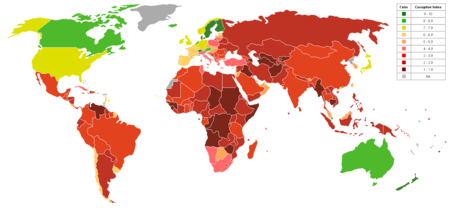Political corruption

Political corruption is the use of governmental powers by government officials for illegitimate private gain. Misuse of government power for other purposes, such as repression of political opponents and general police brutality, is not considered political corruption. Neither are illegal acts by private persons or corporations not directly involved with the government. An illegal act by an officeholder constitutes political corruption only if the act is directly related to their official duties.
All forms of government are susceptible to political corruption. Forms of corruption vary, but include bribery, extortion, cronyism, nepotism, patronage, graft, and embezzlement. While corruption may facilitate criminal enterprise such as drug trafficking, money laundering, and trafficking, it is not restricted to these organized crime activities. In some nations, corruption is so common that it is expected when ordinary businesses or citizens interact with government officials. The end point of political corruption is a kleptocracy, literally "rule by thieves".
The activities that constitute illegal corruption differ depending on the country or jurisdiction. Certain political funding practices that are legal in one place may be illegal in another. In some countries, government officials have broad or poorly defined powers, and the line between what is legal and illegal can be difficult to draw.
Effects on politics, administration, and institutions

Corruption poses a serious development challenge. In the political realm, it undermines democracy and good governance by flouting or even subverting formal processes. Corruption in elections and in legislative bodies reduces accountability and distorts representation in policymaking; corruption in the judiciary compromises the rule of law; and corruption in public administration results in the unfair provision of services. More generally, corruption erodes the institutional capacity of government as procedures are disregarded, resources are siphoned off, and public offices are bought and sold. At the same time, corruption undermines the legitimacy of government and such democratic values as trust and tolerance. (See: Good governance)
Economic effects
Corruption also undermines economic development by generating considerable distortions and inefficiency. In the private sector, corruption increases the cost of business through the price of illicit payments themselves, the management cost of negotiating with officials, and the risk of breached agreements or detection. Although some claim corruption reduces costs by cutting red tape, the availability of bribes can also induce officials to contrive new rules and delays. Openly removing costly and lengthy regulations are better than covertly allowing them to be bypassed by using bribes. Where corruption inflates the cost of business, it also distorts the playing field, shielding firms with connections from competition and thereby sustaining inefficient firms.
Corruption also generates economic distortions in the public sector by diverting public investment into capital projects where bribes and kickbacks are more plentiful. Officials may increase the technical complexity of public sector projects to conceal or pave way for such dealings, thus further distorting investment. Corruption also lowers compliance with construction, environmental, or other regulations, reduces the quality of government services and infrastructure, and increases budgetary pressures on government.
Economists argue that one of the factors behind the differing economic development in Africa and Asia is that in the former, corruption has primarily taken the form of rent extraction with the resulting financial capital moved overseas rather invested at home (hence the stereotypical, but often accurate, image of African dictators having Swiss bank accounts). In Nigeria, for example, more than $400 billion was stolen from the treasury by Nigeria's leaders between 1960 and 1999.[2] University of Massachusetts researchers estimated that from 1970 to 1996, capital flight from 30 sub-Saharan countries totaled $187bn, exceeding those nations' external debts.[3] (The results, expressed in retarded or suppressed development, have been modeled in theory by economist Mancur Olson.) In the case of Africa, one of the factors for this behavior was political instability, and the fact that new governments often confiscated previous government's corruptly-obtained assets. This encouraged officials to stash their wealth abroad, out of reach of any future expropriation. In contrast, corrupt administrations in Asia like Suharto's have often taken a cut on everything (requiring bribes), but otherwise provided more of the conditions for development, through infrastructure investment, law and order, etc.
Environmental and social effects
Corruption facilitates environmental destruction. Although even the corrupt countries may formally have legislation to protect the environment, it cannot be enforced if the officials can be easily bribed. The same applies to social rights such as worker protection, unionization and prevention of child labor. Violation of these laws and rights enables corrupt countries to gain an illegitimate economic advantage in the international market.
As the Nobel Prize-winning economist Amartya Sen has observed that "there is no such thing as an apolitical food problem." While drought and other naturally occurring events may trigger famine conditions, it is government action or inaction that determines its severity, and often even whether or not a famine will occur. Governments with strong tendencies towards kleptocracy can undermine food security even when harvests are good. The 20th century is full of many examples of governments undermining the food security of their own nations – sometimes intentionally.[4]











































.jpg)
.jpg)













.jpg)
